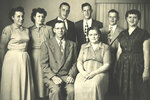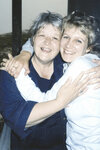


Born in 1931, Phyllis Henry was one of six children raised on the family farm in rural Iowa. Her education began in a one-room schoolhouse. She had one friend, Edna. They walked to school or took the pony, Trixie, and the cart with red wheels that could fit three people squeezed in.
Few women would credit a marriage that ultimately ended in divorce for making them the person they are today, but Phyllis Henry is no ordinary woman.
Bill Glass
At the age of 15, Phyllis began dating Bill Glass and only him until they married after she turned 18.
Two years older, Glass was extremely controlling. Phyllis was his possession. Their first child, a daughter, was followed by twins, a boy and a girl, nearly two years later. She was supposed to look good. The kids were to be well-behaved.
Phyllis said she dropped 20 pounds after delivering the twins but still couldn’t get into her regular clothes, so she put on a maternity dress. Bill looked at her, disgusted, and told her she looked pregnant as if it were the worst thing she could be.
They lived in a house with a storefront in Lincoln, Iowa, a town of 200. Phyllis had gone to beauty school when she was 17. After the twins were born, she opened a beauty shop three days a week.
Although the couple never discussed it, when the twins started kindergarten, Phyllis enrolled at Iowa State University to pursue a major in English with a minor in philosophy.
Glass grew more possessive. Phyllis recalls her son hugging her, at about age 10, and Glass telling her, “The only reason he did it was to put his nose between your boobs.” He even began secretly audio recording his wife and children as they watched television, for no apparent reason.
Listening? For what?
“Oh God, it was just so sad, you know?” she said. “I finally divorced him, but it took me a long time because I really didn’t have a way to earn a living.”
Phyllis was about to finish her degree and their kids were in junior high or high school by the time she divorced Glass in 1967.
“I think of how dumb I was in those years,” she said.
In the courtroom, her husband’s attorney offered $75 child support per kid.
“The day the divorce was finalized, the judge looked at me and said, ‘I think you are putting pride ahead of practicality by agreeing to that amount,’ but I was convinced I could get by and didn’t need Bill’s help.”
The $225 check arrived every month, but they never saw Glass again.
Two weeks after graduation, the university’s English department chair called Phyllis and offered her a job. She taught freshman English at Iowa State, but at the lowest level, not earning much. In the summers she taught English as a second language to make ends meet.
She could have stayed and might have been tenured, but she made up her mind that when the last of her kids graduated from high school she would quit teaching and do something else.
Both girls had finished high school and moved on, and her son moved shortly after. They didn’t need her anymore.
“I always said a successful parent is one who raised a child who doesn’t need them but comes to visit once a year,” she said. She hadn’t known that kind of freedom before. “So, I rented the house out to some couple and moved to Washington, D.C. in 1973. I didn’t plan ahead at all. I just loaded my car with what would fit and left everything else behind.”
For three glorious months, she lived in a boarding house and explored the city. She sat on the Capitol steps and listened to the Army and Air Force bands. She spent days at the Smithsonian. She walked everywhere.
“I was into politics then and I could go and sit in the Senate, and I could see people like Kennedy and McGovern walking in front of me. I was just so excited for me.”
Going for it
Phyllis applied for a job at a court reporting firm without knowing what the job was. Many places told her she was overqualified, but this one hired her. Her job was to train the typists, proofread their work, and help with writing.
Over the next year, she did every job there. One of her co-workers, a court reporter named Gene, and his friend Lou who lived in Camp Hill, Pennsylvania, were talking about starting a business up there.
“I had a little money and said, ‘Yes, I could do that.’ So, for no reason at all, I quit my job and moved to Camp Hill with them.”
Within a year-and-a-half, neither of the men could make it financially. They had families to support and three people trying to live off one startup business was too tight, so Phyllis bought them out.
There they were, Phyllis and three new court reporters, all women, one had a year of experience, the rest with less. Phyllis had no idea she was breaking any glass ceiling.
“I started writing to state government agencies,” she said. “The business grew until I had almost every contract with the government out there — the environmental hearing board, all the labor and industry, the labor relations board, all the business. We were one of the big court reporting firms in Pennsylvania.”
Everyone was earning a decent living. “Court reporting was excellent for women,” she said. “If they took a hearing on a Monday, they might take Tuesday and Wednesday to type it. They’d be home with their kids. They didn’t need a wardrobe, aside from once or twice a week when they went to a hearing. They could decide the week before, on a Friday, which days they wanted off the next week.”
Her staff in Philadelphia were almost all Black women. In Harrisburg it was mostly white women, although she said there were some good men there.
“I hired both men and women as court reporters at absolutely equal pay, by the page, always,” Phyllis said. “I didn’t know I was ahead of the times.”
She got a call from the father of one of her court reporters. The man’s other son, Craig, had been picked up for selling marijuana to an agent and could go to prison if he didn’t have a job. The father even offered to pay his salary.
Phyllis needed someone to run her copier at the time, so she hired Craig. Over the next eight years she trained him to do every single thing.
“He ran the business exactly like I would, except he was tighter with money,” she said.
It was a very good business, she said, with staff in Pittsburg, Philadelphia and Harrisburg, employing about 70 to 75 people.
“Early on we had paid leave for pregnancy, profit sharing and stuff like that,” she said. “We did all the stuff that people are fighting for today. Craig was a decent person too. We just thought that’s how you run a business. This greed today? It’s something I can’t comprehend.”
Bill Henry
During those eight years, Phyllis often went to the shore at Long Beach Island, New Jersey, where she met her second husband, Bill Henry.
“We didn’t get married right away. Bill still had a wife,” she said. His wife had a major heart problem. They’d been separated for over 10 years, but Bill would not divorce her because of his military insurance. She eventually died.
He had retired from the Air Force after 20 years and worked for the Federal Aviation Administration in New Jersey as a fireman, going to crash rescues.
“Bill was funny, loving, and always a surprise,” Phyllis said. “There would be a flower or a knickknack he thought I might like, always little stuff like that. We talked, we really talked.”
When they lived in Pennsylvania, Bill and his friends loved flying ultralights and had all sorts of adventures. “The guys were like teenagers. They flew wing tip to wing tip, like eagles. Bill flew in flocks of swans. He would come home so excited and always wanted to share it with me.”
Bill Henry just loved to fly. He would fly Phyllis up to altitude and then — turn the engine off.
“We would be gliding around, and it was so quiet,” she said. “You could hear a cow walk across the field because we were up so high.”
She read once that in every relationship one does more loving than the other.
“I think in that relationship, he did,” she said. “I mean, I loved him dearly, but I wasn’t as generous with myself as he was with me.”
The Henrys moved to Harrisburg for a while, but they were both restless.
When they visited the Iowa farm where Phyllis grew up. Bill walked around the farm and said, “Wouldn’t it be great to live here?”
Phyllis said she laughed, “Here? On this farm?” The key feature was a big open area beyond the barn where Bill could fly his ultralight planes, so they built a giant hangar for him there. They lived in that farmhouse for many years, traveled, and enjoyed each other’s company.
Dealing with the past
While growing up in that same farmhouse, Phyllis was molested by an older brother for years. But she said she didn’t even know that was bad.
“It never dawned on me to tell my mother about it,” she said, “I didn’t tell anybody until I was about 60 years old.”
Phyllis got involved with a group called Seeds of Hope, working with sexually abused women. “I got to thinking more and more about it,” she said. “My granddaughter was about the same age then as I was when I started being molested.”
Phyllis began therapy once a week with a counselor.
“I went to her for years and years,” Phyllis said. “Even after we were through the childhood sexual assault, I was able to talk to her about any problem in my life. I used to say I had to pay for a friend, but I knew it was safe to tell her anything. But she died too, of cancer. Everybody dies.”
Then in 2004, Bill died. Phyllis had a knee surgery that went bad and became infected. Her daughter, Domoni, insisted that she come to Seattle for treatment by University of Washington doctors. Phyllis came out, had the surgery, and didn’t go back. She lived in her daughter’s house until she moved to the Key Peninsula in 2005.
Phyllis wasted no time. She worked for many local nonprofits. She’s been a regular volunteer for the Angel Guild and served on its board, as well as the boards of KP Community Services Food Bank and Senior Center and The Mustard Seed Project, and she remains an active member in several local groups. She is also a multi-award-winning columnist for the Key Peninsula News.
Now living in an apartment at an assisted living center in Gig Harbor, Phyllis said, “I get really lethargic some days, but I’ve got to try harder.
“Being open is still important. Most of the stuff I did in my life I did because I didn’t automatically say no.”
UNDERWRITTEN BY THE FUND FOR NONPROFIT NEWS (NEWSMATCH) AT THE MIAMI FOUNDATION, THE ANGEL GUILD, ADVERTISERS, DONORS AND PEOPLE WHO SUPPORT INDEPENDENT, NONPROFIT LOCAL NEWS